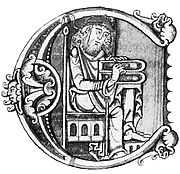Tampilan
Anicius Boethius (480 - c. 524 A.D.) was a 6th century Christian philosopher, often called "the last of the Romans." He was born in Rome to an important family — many of his ancestors had been consuls, including his father Flavius Manlius Boethius in 487 — but he served as an official for the kingdom of the Ostrogoths. In 522 he also saw his two sons become consuls, but he was later executed by King Theodoric the Great on suspicion of having conspired with the Byzantine Empire and is thus considered a martyr in church history.
"During his imprisonment he wrote his famous De Consolatione Philosophiae, in which the author holds a conversation with Philosophy, who shows him the mutability of all earthly fortune, and the insecurity of everything save virtue. The work, which in style imitates the best Augustan models, is theistic in its language, but affords no indication that that its writer was in fact a Christian. Boethius was the last great Roman writer who understood Greek and his translations of Aristotle were long the only means of studying Greek philosophy. His manuals on arithmetic, astronomy, geometry and music were generally used in medieval schools." [1]
Resources
- John Marenbon, Boethius. Oxford: Oxford University Press (2003). ISBN 0195134079
